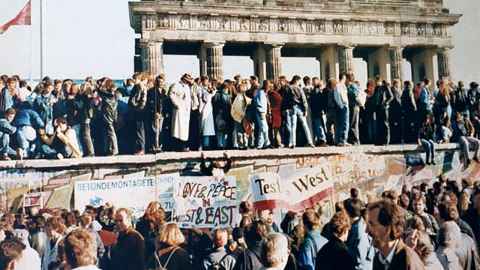The fall of Berlin Wall through a child’s eyes
8 November 2019
Opinion: As the world marks 30 years since the fall of the Berlin Wall, Dr Diana Feick shares her recollections and experience as a child meeting the West.

I was only 11 years old when the Berlin Wall came down.
Back then we lived in a place called Karl-Marx-Stadt (Karl Marx town – I used to be proud of that). I remember images on our TV screen of people in Berlin celebrating atop and on either side of the wall. They seemed to be in ecstasy. I didn't feel like that at all.
My parents didn't seem to feel that way either; it didn't seem that what had just happened was something they had been waiting for. I felt l was supposed to believe that, like the West German politicians on TV said, something extraordinarily good had just happened: “Jetzt wächst zusammen, was zusammen gehört!” (“Now will grow together what belongs together”). I wondered if I wanted to belong to these people from West Germany; did we really belong together? Weren't they totally different people who just happened to speak the same language? A people who believed in a complete opposite ideology, where a state would allow people to be unemployed, homeless, drug addicted, suffering from hunger and even worse, Neo-Nazis?
On the other hand, my parents didn’t seem to be opposed to this change. They said that now we could travel everywhere we wanted to. Our first trip outside Germany in 1992 took us to the Costa Brava in Spain, where we got acquainted with mass tourism and an exciting feeling about an unknown culture.
But apart from that there was more a feeling of confusion, maybe even apathy, “Let's wait and see what happens next." There were attempts to reform our socialist system, one that I strongly believed in, into a more democratic version, learning from the mistakes of the past in order to make it better.
But the Monday demonstrations (peaceful protests held throughout East Germany and named after Leipzig where they always took place on Mondays) continued after the border to the West was opened, and the slogans slowly changed from “Wir sind das Volk” (We are the people) to “Wir sind ein Volk” (We are one people). And then I slowly realised that the world that I used to know was falling apart.
The name of my home town changed – people voted in a poll to take back its pre-GDR name: Chemnitz (a name my great-grandfather had used from time to time). For the first time I saw forests that were fenced in as 'private property' and didn't belong to the people like every public item in the GDR, where even the chairs in my school had a label on them saying: 'Volkseigentum' (the People's property).
When we started our first trips into West Germany we were stunned and overwhelmed by the colours, tastes and smells of 'capitalism' – all of a sudden, every product from the West was considered of higher quality than our local goods (which we later would realise was quite the opposite).
More and more, I had to wonder what to purchase and what objects to desire. There were too many choices and so we normally would go for the cheapest or the most exotic. I remember one day my dad bringing home a small egg-shaped, potato-like fruit with a brown 'fur' on it, and we learned that this was a kiwifruit. We didn't know how to eat it because it was as hard as stone.
In school we got new subjects to learn, like English. The teachers suddenly wanted to talk about democracy with us and they were interested in our own personal opinion on things. I wondered constantly how to develop an independent, or even critical opinion, since the important questions in society seemed to already have a self-explanatory, logical answer.
I believed I knew what a good political and economic system was and what a bad one was. What was there to debate?
I was more interested in understanding why the people that we were supposed to reunite with were so different from me and all the other people that I knew. When I was invited to stay with a host family in a small village in southwest Germany on a school exchange trip, to my surprise I discovered that I didn't understand their dialect at all.
Communication was practically impossible, and the harder I tried the more frustrated I felt. I sensed that the kids in this school were different from my friends. Not only were they better dressed, but they seemed to be so much more self-confident. They could openly discuss topics in class and they had their own opinion on things. I was intimidated and I didn't want to go there ever again.
Nobody really told me how to deal with all this. Everybody seemed to be caught up in their own ideological survival mode. Looking back, I guess this was the hardest lesson that I had to learn in life: that the one truth you deeply believed in turned out to be just one way out of thousands of ways to look at and understand things. It was maybe easy to tear down the concrete wall in 1989, but observing my friends and family nowadays, I still can see how hard it is to overcome the wall in our heads.
Dr Diana Feick is a senior lecturer in European Languages and Literature in the Faculty of Arts.
This article reflects the opinion of the author and not necessarily the views of the University of Auckland.
Used with permission from Newsroom The fall of Berlin Wall through a child’s eyes 8 November 2019.
Media queries
Alison Sims | Research Communications Editor
DDI 09 923 4953
Mob 021 249 0089
Email alison.sims@auckland.ac.nz